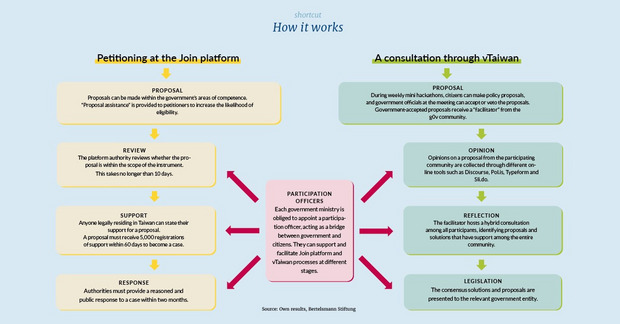Democratic governments around the globe are increasingly seeking to find new and effective ways to involve citizens in policy making. Through its unique blend of trust between citizens and government, and the existence of a vibrant, tech-savvy civil society, Taiwan has become a front-runner in the development and implementation of innovative citizen participation. Two instruments in particular stick out: the Join platform and vTaiwan.

The Join platform & vTaiwan
From “sunflowers” to innovative citizen participation.
Over the past decade, Taiwan has developed into a vibrant and innovative participatory democracy. A key milestone in that process was the so-called “sunflower movement” in 2014, when hundreds of protesters occupied the parliament to protest a new trade bill with mainland China. What in other countries could have led to lasting conflict and rupture was the starting point of a prolific cooperation between Taiwan’s old political guard and the innovative tech community representing the protesters. Together, civil society, “civic hackers”, and government developed and implemented several advanced participation instruments, substantially increasing citizens’ impact on policy making, most notably vTaiwan and the Join platform.
Though born out of the same civic ethos of cooperation between society and government, vTaiwan and the Join platform are two distinct participation instruments. vTaiwan is an online-offline platform run by a collective of “civic hackers” called gOv (“gov-zero”). It is designed to enable open, in-depth, and lengthy consultation processes between the government, citizens, and policy stakeholders. The Join platform is a government-run participation hub that is most notable for its petitioning function but also offers several feedback and discussion options. It allows anyone legally registered in Taiwan to file a proposal with the national government and gather support. A proposal that receives at least 5,000 supporters will be discussed by the relevant government agencies, who must provide a reasoned response.

The Join platform: The case of menstrual cups
Problem
Menstrual cups were banned for several years in Taiwan, and only certain international products could be sold in physical shops, not online. A group of start-up business women wanted to change that.
Participation
The group started an online petition on the Join platform and gathered the support of 6,100 people within two weeks.
Impact
The group was able to develop legislative comparisons with other countries, question what constitutes a medical device in Taiwan, and develop ideas for better access to menstrual products, particularly online, for Taiwanese women. The proposal was approved by the relevant authorities in March 2017.
vTaiwan: The UberX case
Problem
The arrival of the app-based taxi service Uber Taiwan in 2013 created conflicts between taxi services. In August 2015, at the request of several government services, vTaiwan hosted the Uber case.
Participation
Stage I: gOv facilitators helped define the topic and reached out to possible participants (Uber drivers, taxi service providers, policy makers, and others) to participate via the Pol.is tool.
Stage II: more than 4,500 citizens participated on Pol. is and voted on 145 opinions. Two groups emerged from the process, one pro-Uber, the other against.
Stage III: a two-hour public meeting was organised with all relevant stakeholders and the public to refine the results from stage II.
Impact
Stage IV: proposals from the public meeting were developed into a draft bill and sent to parliament, many proposals passed.

Strengths of The Join platform
- Straightforward
It offers a clear and well-designed platform, making it easy to petition and rally support. By June 2022, 13,853 proposals had been made, with 289 meeting the threshold. - Strong institutionalisation
Participation officers are involved in supporting petitioners and in steering and facilitating the process. The process is swift and authority responses tend to be thorough and genuine.
Limitations of The Join platform
- Lack of deliberation
Though it allows for comments and suggestions by citizens, and government responses engage with the topics raised, there is little in-depth interaction in the petitioning process. - Low threshold
5,000 supporters is a low threshold. In Latvia a petition on the public platform manaballs needs 10,000 signatories to advance.
A low threshold can lead to a lack of diversity among supporters.
Strengths of vTaiwan
- Engaging, open, and innovative
vTaiwan offers an engaging and open participation process at several flexible stages. For example, the opinion stage can last several rounds and use different online tools as Pol.is or Sli.do. - Consensus in online interaction
With its use of consensus-finding tools such as Pol.is and its stakeholder support, vTaiwan is a role-model for constructive and interactive online engagement.
Limitations of vTaiwan
- Complex and tech-intensive
Several stages and intense engagement make for a demanding participation process, but can hamper inclusivity. Tech-savvy, educated participants are at an advantage. Thus, vTaiwan is now mainly used for policies concerning the digital sphere. - Lack of institutionalisation
It struggles to strike a balance between open and flexible processes on one hand and clearer rules and structures on the other. The government can refuse to discuss issues on vTaiwan.

No perfect offering but plenty of inspiration:
What others can learn from Taiwan
When asked what Taiwan can offer other countries, digital minister Audrey Tang replied it has “no perfect offering”. It would be impossible to transfer the unique Taiwanese blend of common sense, trust in authorities and vibrant protest culture directly to any other political context. Taiwan does not provide a readymade model, but rather the sense that constant experimentation and innovation in citizen participation is necessary to improve old approaches and develop new ones that are fit for purpose.
Still, Taiwan’s experiences with the Join platform and vTaiwan are a welcome testing ground for new and innovative formats and methods combining various tools, methods, and strategies. An important lesson from both instruments is the need for a participatory culture and infrastructure within government and public service. Both instruments work because their purpose and functioning are clear to the government and the citizenry. Both are embedded in an infrastructure of participation officers, facilitating participation at all levels, and a genuine openness from public officials and politicians to Taiwan’s civic tech movement and citizens’ input.
For citizen participation in Taiwan, the challenge is to avoid complacency. Taiwan needs to continue to strike a delicate balance between experimentation and tangible outputs for citizens. vTaiwan was once the next big thing in participatory democracy, but over time, the drawbacks of its complexity and tech focus started to show, with other alternatives such as the Join platform gaining popularity. During the pandemic, Taiwan succeeded in introducing several innovative, inclusive and effective policy innovations that further solidified citizens’ trust in their political system. If Taiwan continues on this road, it will remain an inspiration for aspiring democracies all over the world for years to come.

About Taiwan
Population
23.5 million (roughly a third of Germany’s population)
Population density
641 per km² (roughly three times that of Germany)
BTI Transformation Index ranking in 2022
3 (out of 137 countires)
V-Dem participatory principle of democracy ranking in 2022
4 (Germany 20)
Other participatory innovations in Taiwan
"The presidential hackathon" is a platform for the tech community and the government to connect and explore new solutions through innovative ideas based on open data.
"The social innovation lab" opened in Taipei in 2017 as a hub for all social innovation initiatives in Taiwan. Digital minister Audrey Tang holds regular meetings in the lab with social innovators.
“Media literacy”was introduced to Taiwan’s school curricula, including lessons on critical social media usage, identifying disinformation, and media production.
Message to go:
Digital citizen participation in Taiwan works because of its vibrant tech community, its civic culture, and its innovative participation infrastructure.
Authors
Stefan Roch
stefan.roch@bertelsmann-stiftung.de
Charlotte Freihse
charlotte.freihse@bertelsmann-stiftung.de
Bruno Kaufmann
bruno.kaufmann@swissdemocracy.foundation
Sources and further reading
Dominik Hierlemann & Stefan Roch (2020). Digital Democracy: What Europe can learn from Taiwan.
Taiwan Country Report.
The Join platform.
The vTaiwan platform.
The UberX case.
The menstrual cups case.
Yu-Tang Hsiao et al. (2018). vTaiwan: An Empirical Study of Open Consultation Process in Taiwan.
Audrey Tang (2022). What the World Can Learn From Taiwan’s Digital Democracy. Wired.
Ming-sho Ho (2022). Exploring Worldwide Democratic Innovations – a case study of Taiwan.
Imprint shortcut
Democracy and social cohesian
© September 2022 Bertelsmann Stiftung
Bertelsmann Stiftung | Carl-Bertelsmann-Straße 256 | 33311 Gütersloh
www.bertelsmann-stiftung.de/en/home
Responsible:
Dr Dominik Hierlemann, Prof Dr Robert Vehrkamp, Anna Renkamp
Cover picture: © Getty Images/iStockphoto/LeoPatrizi
The shortcut series presents and discusses interesting approaches, methods, and projects for solving democratic challenges in a condensed and illustrative format. The Bertelsmann Stiftung‘s Democracy program publishes it at irregular intervals.

